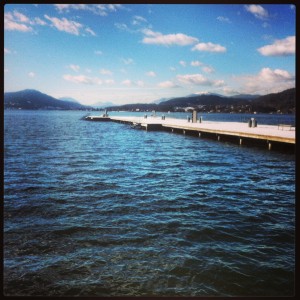
Klagenfurt am Wörthersee, Winter 2012/2013
Special Session Organizers: Tobias Hossfeld and Lea Skorin-Kapov
Internet applications are often delivered with reliable transport protocols like TCP. As a consequence, the contents are not corrupted by the delivery over the Internet, since the protocol itself takes care of corrupted or lost packets. However, the available network capacity determines the user perception, e.g. the time for downloading a web site, video playback interruptions due to buffer underrun, etc. Most of the relevant stimuli in this domain are thus of temporal nature and have to be taken into account when web applications are delivered over the Internet. Hence, due to the technical implementation of web applications, novel stimuli need to be considered for QoE.
In a similar way, the technical implementation of cloud applications leads to novel kinds of artifacts and QoE issues. Cloud applications are typically also delivered via the Internet with reliable transport mechanisms. Thus, again temporal stimuli may influence and decide Cloud QoE. However, due to their distributed nature and resulting higher degree of complexity, QoE dependencies from factors such as network quality require dedicated research activities as they cannot be mapped from traditional application paradigms. Cloud gaming for example is per definition a gaming application, however, the game graphics may be rendered in the cloud and delivered as video stream to the end user (for several reasons). In the uplink direction, the user interacts with the cloud game and sends the gaming control commands. Hence, neither existing gaming QoE models nor video streaming QoE models are applicable. The same is true for other cloud applications, like office solutions, remote desktop applications, and collaborative applications. These kinds of interactions between end user and cloud have to be taken into account and the technology-driven impairments require new QoE models.
A key research question is to understand the effect on QoE when running that particular service on the cloud. For example, the distributed processing of data may cause novel kinds of artifacts and QoE issues such as temporal inconsistencies. In the case of media–applications sensitive to synchronization issues this may become an issue (e.g. game state in MMORPGs (Massively Multiplayer Online Role-Playing Game) with thousands of concurrent users on several geographically disperse servers). Due to the flexibility to compose new cloud services, novel influence factors on QoE e.g. viewing angle for personalized live 3D video streaming, or perceived presence for social–IPTV applications may emerge. Further, cloud-based processing enables advanced multi-modal interfaces e.g. based on combined voice and gestural interaction, requiring dedicated multi-model QoE models and metrics as well as mechanisms for distributed processing of sensor data-streams. In a generic Cloud service (i.e. not necessarily media-related) context, several factors affect the perceptual quality of the end user, ranging from the obvious e.g. (network performance, choice of platform, infrastructure capabilities) to the not-so-obvious (e.g. service load variability with time and geographical user distribution). Suitable ways to model and measure these factors are thus needed to feed QoE estimations.
Tobias Hossfeld studied computer science at the University of Würzburg, Germany. He finished his PhD on performance evaluation of future Internet applications and emerging user behavior in 2009. He is heading now the FIA research group Future Internet Applications & Overlays at the Chair of Communication Networks in Würzburg. He has been visiting senior researcher at FTW in Vienna with a focus on Quality of Experience research. His main research interests cover social networks, crowdsourcing platforms, content distribution networks and clouds, as well as investigations on Quality of Experience for Internet applications like Skype, YouTube, Web Browsing or cloud applications in general.
Lea Skorin-Kapov is an Assistant Professor at the University of Zagreb, Croatia where she received her PhD in 2007. She has over 8 years of previous experience in industrial research as a senior researcher and project manager in the R&D Center of Ericsson Nikola Tesla, Zagreb, Croatia, working in the areas of QoS signaling and negotiation for multimedia services. Her main research interests are related to QoE modeling of multimedia and Web-based applications, and negotiation and optimization of QoS/QoE in converged IP networks. She is a Croatian Management Committee member in COST IC1003 QUALINET, and participates in the Celtic+ QuEEN project.
 Peter Purgathofer is Associate Professor at the Faculty of Informatics, Vienna University of Technology. He is Coordinator for the Media Informatics Master Program, and has a long experience researching, reflecting and teaching Interaction Design/User Experience in theory and practice, in a wide array of fields reaching from bank POS terminals to digital games.
Peter Purgathofer is Associate Professor at the Faculty of Informatics, Vienna University of Technology. He is Coordinator for the Media Informatics Master Program, and has a long experience researching, reflecting and teaching Interaction Design/User Experience in theory and practice, in a wide array of fields reaching from bank POS terminals to digital games.










